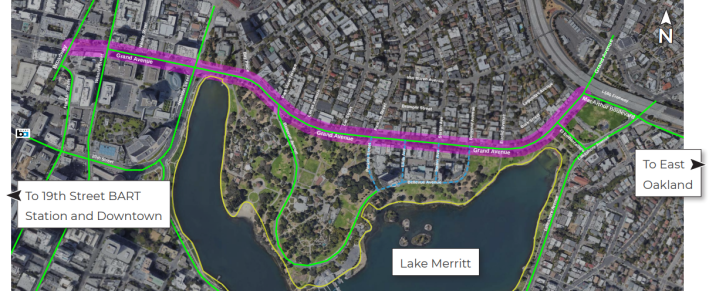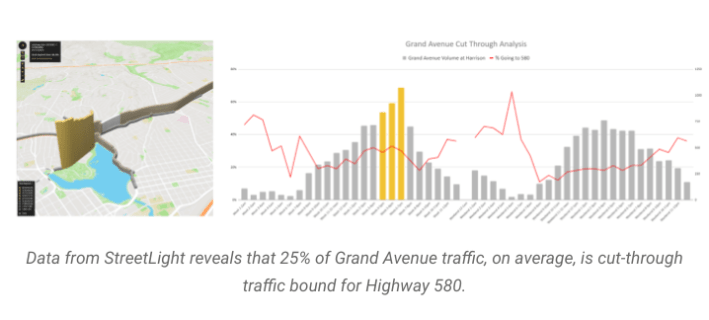A new study from StreetLight Data, a company that analyzes motor-vehicle movements, suggests that concerns by AC Transit that a proposed road diet on Grand Avenue could delay busses is unfounded. "Road diets frequently raise concerns that lane reductions will worsen congestion even as they improve safety," wrote the company in a statement about the study, entitled Balancing Road Safety and Congestion in Oakland: Big Data Analysis Reveals Potential Solutions for a Dangerous Corridor.

Streetsblog readers will recall that Oakland DOT has watered down safety in its designs for Grand Avenue, including eliminating part of a two-way cycle track and squeezing bike lanes. This was done at the request of AC Transit, whose staff was concerned the road diet would slow its buses.
An analysis of the origins and destinations of drivers indicates that they will find alternate routes and alternate modes. The elimination of the two lanes in both directions, moreover, will reduce dangerous speeding, resulting in fewer deadly crashes overall with little appreciable impact on traffic during rush hour and none at all for the rest of the day.
"Importantly, the existing two travel lanes allow cars to travel quickly and unpredictably, making conditions unsafe for bicyclists and pedestrians," wrote study author Hunter Irvin.

As indicated in the above chart from the study, 25 percent of Grand Avenue traffic is cut-through traffic for Highway 580. "Congestion can be reduced by promoting modeshift to transit and active transportation," wrote Irvin. "There is reason to suspect that a road diet on Grand Ave. could still be a viable solution to safety concerns along this high-injury roadway, and may merit particular consideration on the areas of the roadway where high pedestrian activity and high speeds dangerously coincide."
The release of this study coincides with the death of a child on Lakeshore, killed when an inattentive driver opened his door into the existing, unprotected bike lane. The location where the girl was killed is another leg--in addition to Grand--of an overall project to ring Oakland's Lake Merritt with a two-way protected cycle track. To date, less than half a mile of this vision has been built, on Lakeside on the western edge of the lake. The study results are just another indication that there's no downside to completing this project without delay.
Be sure to check out the entire study.





